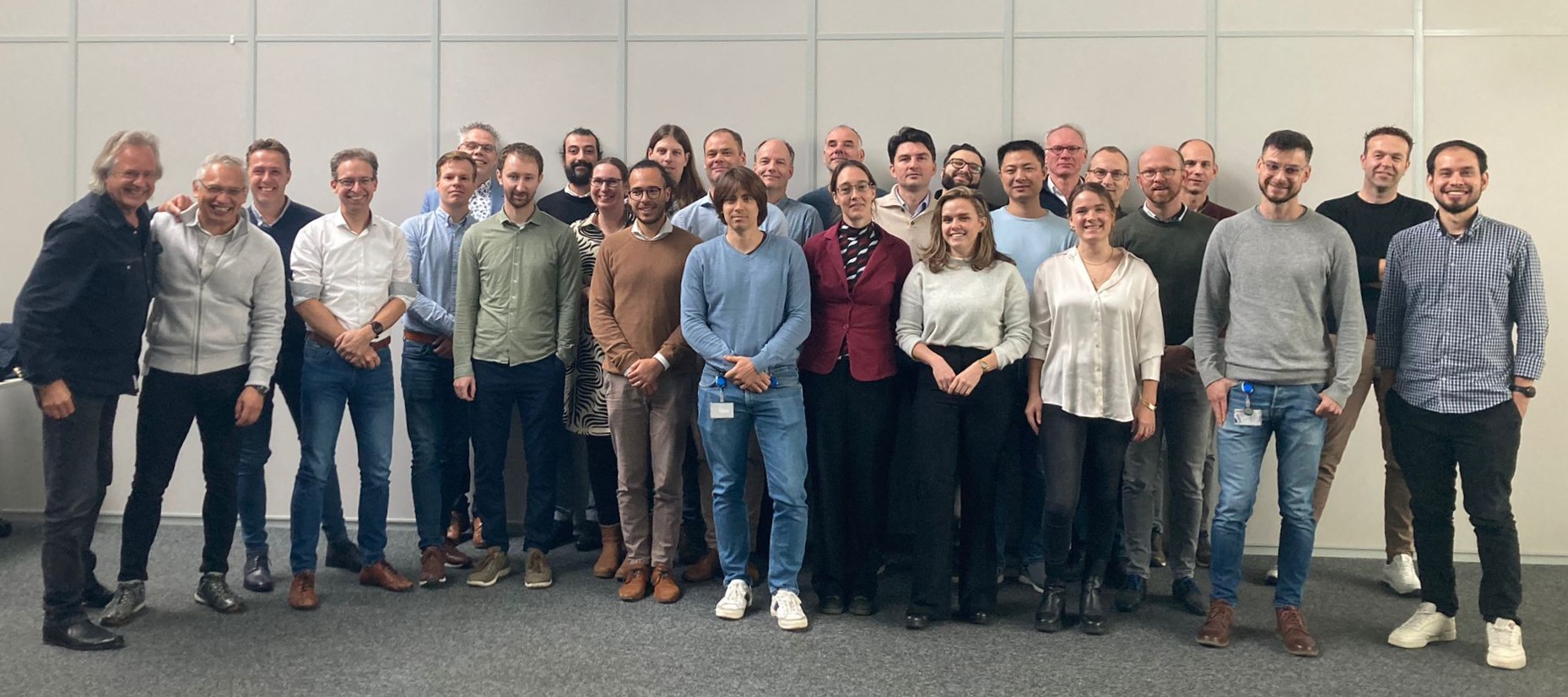Future diagnostics now! Project BIOMED02 Turns the Gears of Industry Towards A Healthier Future
On October 30th, project BIOMED02, supported by the Dutch NXTGEN HIGHTECH growth fund, held its second meeting on the premises of LioniX International in Enschede. With 31 representatives from the 17 consortium partners present, the lab-on-chip project followed-up its online kick-off of June 2023. BIOMED02 is an ambitious undertaking, with many different sub-projects to coordinate and plan out. As the project lead, LioniX International was happy to facilitate interaction and cooperation among the consortium, and to provide a forum to decide on concrete future steps ahead.
Attendants of the first in-person meeting of the NXTGEN HIGHTECH BIOMED02 project.
Revolutionizing Lab-on-Chip Production
BIOMED02 is dedicated to the development of a high-volume production chain of lab-on-chip-based multi-analyte diagnostics systems operating at point-of-care. These systems include highly sophisticated readout devices as well as necessarily disposable parts like cartridges, test-specific sensor chips, and microfluidics. Lab-on-Chip (LoC) devices are highly dependent on the equipment developed in the semicon industry and its accompanying micro/nanotechnologies. However, they require the integration of many more modalities than electronic circuits: photonic, (micro)fluidic and biotechnology functionalities all comprise the ‘lab’ carrying out diagnostic tests. The equipment and process steps required to fabricate a biochip, glue it together, assemble it with other components, and package the complete device are generally not compatible with existing semicon processes and equipment. Current solutions to this mismatch require many manual actions, which are adequate for the time being due to relatively low production volumes. At the same time, it means that these valuable diagnostic testing modalities remain unexploited in most application fields. Affordable, accurate, and easy-to-use devices remain out of the hands of those who need it.
New, highly automated equipment capable of high throughput production of LoC devices must be developed. The ultimate goal of BIOMED02 is to enable the affordable production of high-tech LoC systems via highly scalable processes, similar to the semicon ecosystem. To achieve this lofty goal, various topics in LoC engineering and manufacturing, integrated photonics and optics, life sciences, and nano-chemical technologies must be addressed. With its well-established expertise in semicon production technologies and LoC research and development, the Netherlands is well-prepared to become a leader in LoC production. The Dutch semicon ecosystem can be leveraged to create reliable and modular LoC production systems.
Revolutionizing Diagnostics with three distinct cutting-edge platforms
To test out and strengthen the production capabilities of the Dutch LoC ecosystem, BIOMED02 is producing three demonstrator biochip platforms. The first platform is an integrated photonics (IPx) biochip, currently being demonstrated in COVID serology test (Surfix Diagnostics), early cancer detection (Qurin Diagnostics), tests for the veterinary sector Animal Health Service (GD), drug development lead screening (Delta Diagnostics). The device is based on proprietary integrated photonics technologies, asymmetric Mach-Zehnder Interferometers (aMZI) and micro-ring resonators which are sensitive to changes in the refractive index of the chip. The core technologies are provided by LioniX International, with a record-holding, ultra-sensitive, label-free sensor chip based on its TriPleX® silicon nitride platform, and by Surfix Diagnostics, with material-specific biofunctionalization and ‘Coat&Close’ bonding and coating techniques for microfluidic chips.
The second platform is based on the revolutionary CRISPR-Cas technique, with its origins at Wageningen University & Research and Scope Biosciences. CRISPR-Cas is applied here to identify specific DNA and RNA sequences. It employs a microfluidics-based version of a Laser-Induced- Fluorescence (LIF) bioassay (Micronit). The bioassay will be further integrated with a unique and highly sensitive IPx-based biochip developed by LioniX International. To demonstrate the power of these additions, the new device will carry out tests for the COVID virus and other infectious diseases (Scope, NYtor), and early cancer detection (University of Twente and VU University Medical Center) in the longer term.
The third platform, developed by Enzyre, combines semiconductor Single-Photon Avalanche Diode (SPAD) sensors with a microfluidic cartridge. This cartridge features a tunable coating, which enables the detection of light generated by enzymatic reactions (chemiluminescence) in nanovolumes of blood plasma. This disruptive technology will be first deployed in a test for blood clotting.
The potential in the developments of BIOMED02 reach far beyond the demonstrator applications listed here. These three platforms allow the measurement of multiple parameters in one sample and are applicable for a wide range of diagnostic tests, including DNA, proteins, metabolites, cells, pathogens, pesticides, antibiotics, toxic molecules, and many more. The production developments also extend past the particular platforms: because the envisioned diagnostic system concept is generically applicable, non-photonic chips also benefit from the development of the LoC production infrastructure required to make the platforms possible. BIOMED02 encompasses a set of developments in the productive and technological capacities of LoC ecosystem in The Netherlands. The success of the project will reify a reliable pathway towards easily-accessible, ubiquitous diagnostics for common and elusive diseases.



